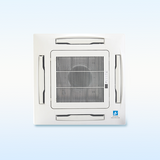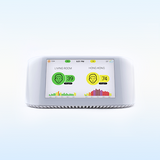How to Select the Best Air Purifier for Office in India, Delhi?
Atlanta Air Purifiers are the best air purifiers for offices in India, Delhi. We are the pioneers in air quality solutions and had a wide range of air purifiers to cater to your needs. For large spaces, call centers, institutions, etc. we have designed a perfect indoor air quality management machine, "HEPA PURE®" which is more than an air purifier & is an excellent solution.
In this blog, you will not only learn about the HEPA PURE® but also will learn more about the pollutants & the various methods to combat indoor air pollution.
Overview
Are you feeling tired, lethargic, or unproductive at work despite getting enough rest? The culprit might be the air quality in your office.
While most of us are aware of outdoor pollution and take measures to protect ourselves, few realize that indoor air can be two to five times more polluted than outdoor air.
Yes! You heard it right. Your daily nine-to-five routine may be exposing you to harmful pollutants like dust, smoke, mold spores, chemicals, and even carbon dioxide.
In this post, we'll dive deep into ways you can combat poor indoor air quality at work and improve your overall health and productivity. So buckle up and let's get started!
Challenges related to air pollution in offices?
Air pollution is a serious problem in many office environments.
Poor air quality can lead to a variety of health problems, including:
- Respiratory illnesses
- Headaches, and dizziness
- Additionally, it can cause fatigue and reduce productivity
There are a number of challenges related to air pollution in offices, including:
- Identifying the source of the pollution: In many cases, the source of the pollution is not immediately obvious. It could be something as simple as an improperly functioning HVAC system or a lack of proper ventilation.
- Addressing the root cause: Once the source of the pollution has been identified, it is important to address the root cause. This could involve making changes to the HVAC system, increasing ventilation, or implementing other office-wide changes.
- Communicating with employees: It is important to keep employees informed about the steps being taken to improve air quality in the office. This can help reduce anxiety and encourage employees to cooperate with any necessary changes.
- Monitoring air quality: Once changes have been made, it is important to monitor air quality on a regular basis. This will help ensure that the improvements are effective and that any new problems can be quickly addressed.
How does air pollution affect the health of employees?
When it comes to indoor air pollution, the workplace is one of the most commonly affected environments. Poor indoor air quality can have a number of negative effects on employees, ranging from minor health problems to more serious conditions.
Some of the health problems that can be caused by indoor air pollution include headaches, fatigue, difficulty concentrating, and irritability.
In more severe cases, indoor air pollution can cause respiratory problems such as asthma and bronchitis.
It can also aggravate existing health conditions such as allergies and heart disease.
There are a number of factors that can contribute to poor indoor air quality in the workplace, including:
- Poorly maintained ventilation systems
- Cleaning chemicals
- Office furniture
- and carpeting
Employees who are exposed to high levels of indoor air pollution on a regular basis are at an increased risk of developing health problems.
Employers should take steps to ensure that their workplace is free of indoor air pollution.
This includes:
- Maintaining a clean and well-ventilated work environment
- Using natural or low-emitting cleaning products
- and avoiding the use of office furniture and materials that emit harmful chemicals.
- Educating employees about the risks of indoor air pollution and how to protect themselves can also help reduce the incidence of health problems associated with poor indoor air quality.
How do air conditioners contribute to air pollution?
While air conditioners are designed to improve the quality of indoor air, they can also contribute to indoor air pollution.
Air conditioners work by circulating and recirculating air within a space. This process can trap pollutants like bacteria, viruses, etc. within the unit, where they can be re-circulated back into the indoor environment.
Additionally, air conditioners can create condensation, which can provide a breeding ground for mold and other microorganisms.
To help reduce the potential for indoor air pollution, make sure to regularly clean and maintain your air conditioner unit.
The best example of the circulation of infection through air conditioners was in 2020 & 2021 at the time of Covid-19 when the Indian government & WHO issued guidelines for the use of ACs & ventilation to curb the Covid-19 infection.
One of the key reasons that air conditioners were not allowed to operate in commercial buildings at the time of COVID-19 was that they can potentially circulate and spread the virus.
Air conditioners work by circulating air through a system of ducts and filters. If there is someone in the building who is infected with COVID-19, the virus can potentially be circulated through the air conditioning system and infect others in the building.
Additionally, many air conditioners are located in common areas such as lobbies or hallways, which can further spread the virus.
Adverse effects of exposure to CO2
Exposure to high levels of CO2 can have a variety of negative health effects, including headaches, dizziness, difficulty breathing, and even death.
CO2 is an invisible gas that is produced when we breathe out and is present in much higher concentrations indoors than outdoors.
In fact, the EPA has classified indoor air pollution as one of the top five environmental health risks.
While most people are only exposed to relatively low levels of CO2, those who work in enclosed spaces such as offices or factories may be exposed to much higher levels.
This can lead to a condition called "hypercapnia," which occurs when there is too much carbon dioxide in the blood.
Symptoms of hypercapnia include:
- Headache
- Dizziness
- Shortness of breath
- Increased heart rate
- In severe cases, it can lead to unconsciousness and even death
There are a few things you can do to reduce your exposure to CO2 in the office. Make sure that your office has good ventilation, and try to avoid working in enclosed spaces for long periods of time.
If you start to feel any symptoms of hypercapnia, get fresh air immediately and seek medical attention if necessary.
An air purifier can also help to remove CO2 from the air, making the office a healthier place to work.
What can be done to improve air quality in offices?
When it comes to improving air quality in offices, there are a few things that can be done. One is to make sure that the office space is well-ventilated.
This means opening windows on a regular basis to let fresh air in and circulating the air throughout the space.
Additionally, using air purifiers can help to remove pollutants and improve air quality. Finally, it’s important to keep the office clean and free of dust and other allergens that can trigger respiratory problems.
Role of air purifiers in offices to improve air quality?
Air purifiers play an important role in improving air quality in offices. By removing contaminants from the air, they can help to reduce the risk of health problems associated with poor air quality.
Air purifiers can also help to improve the efficiency of office equipment by preventing dust and other particles from building up on them.
Why Atlanta Healthcare Air Purifier is the best air purifier for offices & commercial establishments?
When it comes to choosing an air purifier for your office or commercial establishment, there are many factors to consider.
However, the Atlanta Healthcare Air Purifier is the best option for many reasons.
- For one, it comes in a wide range. Atlanta Healthcare has air purifiers designed for small cabins & also has ceiling-mount commercial air purifiers specifically designed for large spaces and can purify the air in an area of up to 3,000 square feet & more.
- Additionally, it features a True HEPA filter that can remove 99.97% of airborne particles as small as 0.3 microns in size – making it perfect for capturing pollutants such as dust, pollen, and pet dander.
- Atlanta Healthcare Air Purifier has a five to seven-stage medical-grade filtration system that includes activated carbon filters to help remove odours and VOCs (volatile organic compounds) from the air. This makes it an ideal choice for office environments where there may be strong smells from printers or other equipment.
- Highly customizable as per client requirements
- Silent operation
- Higher CADR
- Finally, the Atlanta Healthcare Air Purifier is very easy to use, with a simple control panel.
Conclusion
Air purifiers for offices can help reduce the number of pollutants, odours, and allergens that are present in any office environment.
By investing in an air purifier you are taking a proactive step to improve the indoor air quality for both employees and customers alike.
Depending on how large your space is, there are many different models available so make sure to shop around and find one that meets your needs.
With proper maintenance, an air purifier will keep your office clean and smelling fresh for years to come!




















